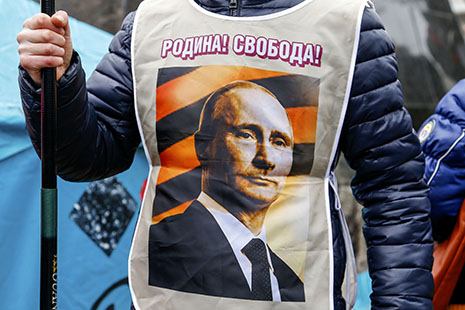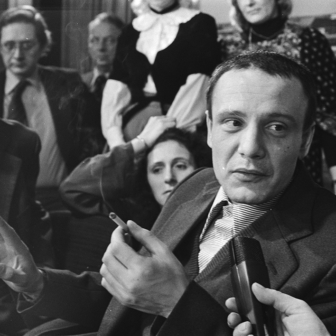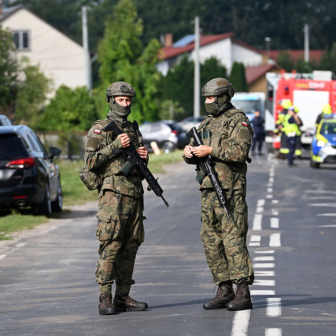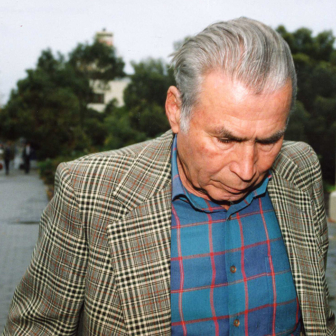RUSSIAN soldiers have sown a minefield to mark the new border between Crimea and the Ukrainian mainland, but it is unclear how long this monument to Vladimir Putin’s ambitions will stand. The future of Ukraine still hangs in the balance. As Russia celebrates the annexation of Crimea, there are disturbing signs that the Kremlin’s campaign to reverse the Ukrainian revolution has only just begun.
One glimpse of the geopolitical ambitions of Putin’s inner circle came from the well-connected Valerii Solovei, a distinguished historian and a professor at Moscow’s Institute of International Relations, the training school for Russian diplomats. On 3 March, Solovei revealed that he had discussed the current crisis with several highly-placed Kremlin “insiders.” They told him that the decision to invade Crimea had been made by Putin and a handful of top officials. If the community puts up no serious resistance, Russia would annex eastern Ukraine.
Such a move would deprive Ukraine of major cities like Donetsk, Kharkov, Odessa, and Dnepropetrovsk. It would tear away its industrial heartland, its shipyards, its coalfields and its agricultural breadbasket. For a country already brought to its knees by economic collapse and political upheaval, such a partition would be nothing short of a cataclysm.
That the Kremlin reserves the right to extend its conquests in Ukraine is suggested by its attitude towards the new Ukrainian government. When asked about Russia’s solemn commitment in the 1994 Budapest treaty to uphold Ukraine’s sovereignty and territorial integrity, Putin endorsed the views of those “experts” who have argued that the uprising in Kiev caused an institutional rupture comparable to the Bolshevik revolution. The result was a new state, “and with this state and in relation to this state we have not signed any binding documents.”
The Kremlin’s spin doctors are unperturbed by the fact that Ukraine’s democratically elected parliament has restored constitutional continuity by announcing elections and voting for a new government. They have repeatedly likened Ukrainian MPs to hostages, incapable of rational judgement because of the neo-Nazi terror that is supposedly raging on the streets of Kiev.
No less ominous is the Russian state’s attachment to the ousted and disgraced president, Viktor Yanukovych. Even as they treat Yanukovych as a political pariah, Russian officials continue to recognise him as the legitimate head of state. In the process, they are buttressing their legal case for full-scale intervention. The letter from Yanukovych waved before the Security Council by Russia’s UN ambassador, Vitaly Churkin, was a call not merely to amputate the Crimean peninsula but also to invade the entire country.
The idea that Russian troops will be welcomed as liberators is being fostered by the so-called Russian Spring in the cities of southeast Ukraine. For several days after Yanukovych’s flight, conditions there appeared to stabilise with the news that a transitional government had been formed. In response, local politicians began to reintegrate into the Ukrainian political system by starting preparations for the May elections. But on the weekend of 1–2 March, groups of pro-Russian youths staged almost identical actions in cities across the southeast, marching under the Russian tricolour, attacking local supporters of the Euromaidan uprising, and attempting to storm local government buildings.
This tumult is far from a spontaneous uprising of the persecuted and the disenfranchised. There are clear signs that its radical core consists of ultranationalists. The ringleader in Donetsk was Pavel Gubarev, a charismatic local businessman, who emerged from obscurity to become leader of the People’s Militia of Donbass and then the self-proclaimed “people’s governor.” On 6 March, he was arrested by Ukrainian security forces and transferred to Kiev. His supporters have cast doubt on the authenticity of photographs, now circulating on the internet, of a younger Gubarev wearing the swastika-like symbol of Russian National Unity, an organisation overtly modelled on Hitler’s Nazi Party. But it is clear from Gubarev’s blog that he belongs to the ultranationalist subculture.
Other heroes of the agitation in southeast Ukraine have come from Russia, where social networking sites have coordinated an influx of volunteers to fight for the reunification of the motherland. The Russian flag was raised over the regional government building in Kharkov not by an oppressed resident but by one of these newcomers, who then tarnished the authenticity of his feat by boasting about it on the internet.
Perhaps the most exemplary “tourist” is Aleksei Khudyakov, a twenty-seven-year-old Muscovite who was at the centre of the agitation in Donetsk. Khudyakov was a prominent activist of Young Russia, a Kremlin-backed youth organisation that for nearly a decade has harassed Putin’s opponents and collaborated closely with extreme nationalists. Most recently, he headed Shield of Moscow, a gang of vigilantes who dressed in balaclavas and wielded baseball bats to hunt down illegal immigrants and hand them over to police. In September last year, he was arrested for his role in a raid on a migrant hostel that provoked a riot.
The presence of interlopers like Khudyakov may explain the extraordinary insensitivity of the “separatists” who disturbed the peace of Nikolaev, a regional capital near the Black Sea. Although the city was a hotbed of protest against police abuses, they chanted, “Glory to Berkut!,” the notorious interior ministry forces responsible for the brutal treatment of protesters on Kiev’s Maidan. The slogan was enough to inspire ten thousand locals to demonstrate the following day for peace and against the infiltration of provocateurs.
EXTERNAL subversion is undeniable, but it would be misleading to ignore the role of domestic factors in the destabilisation of southeast Ukraine. Local power structures were dominated by the corrupt elite of Yanukovych’s Party of Regions, who are now weakened by the breakdown of his regime. On the one hand, this old guard is threatened by the efforts of the victorious democrats in Kiev to purge its most odious representatives. The mayors of both Kharkov and Donbass have been arrested on criminal charges. On the other, there is mass discontent over corruption and falling living standards. Understandably, some functionaries and law-enforcement officers have provided support to the secessionist agitation. Others have been grudging and inept defenders of Ukrainian statehood.
The most vociferous Russian advocates of the dismemberment of Ukraine are a phalanx of pro-Kremlin nationalists. Their standard-bearer is Egor Kholmogorov, a ubiquitous media commentator and one of the most influential and erudite ideologues of the post-Soviet generation of Russian nationalists. In his “Crimean Theses,” a forty-point manifesto released on 2 March, Kholmogorov set out a plan for the subjugation of Ukraine. His starting point was that “every people has the right to reunification within the boundaries of one state,” and that only expediency can limit the Russian people’s exercise of this right.
Kholmogorov took the Kremlin’s dogma about the non-existence of the Ukrainian state to its logical conclusion. “Russia has no reason,” he declared, “to recognise the rule of the illegitimate regime in Kiev over the southeast.” Any attempt by the Ukrainian military to use force should be regarded as the actions of “illegal armed formations” that must be disbanded. Russia’s task is not merely to absorb the Crimean peninsula but also to partition mainland Ukraine. Russian soldiers will guarantee the security of the “illegally severed territories and the Russian population of Ukraine” while referendums take place on reunification with Russia. In the western rump of the country, they will wage an “anti-terrorist operation” to secure nuclear power stations and detain those involved in anti-Russian acts of terrorism.
Kholmogorov’s belligerence is echoed by some of the Kremlin’s most trusted propagandists. Sergei Markov, a semi-institutional figure who sits in Russia’s Public Chamber, argued on 8 March in an op-ed piece that there would be war because the “extremists” who seized power in Kiev “want to see a bloodbath.” Russia did not need Crimea, but it would not leave the people of southeast Ukraine at the mercy of “Russophobic and neo-Nazi gangs.”
The “Russian Spring” in southeast Ukraine was supposed to legitimise Russian intervention, but it has disappointed the expectations of many of its Russian admirers. Nowhere has it become a mass uprising. Nowhere has it produced crowds large enough to establish a stranglehold over public space and paralyse state institutions. Nowhere have its leaders acquired the authority to speak in the name of the population when requesting Russian assistance against the “neo-Nazi junta” in Kiev. A week after fantasising about Russian soldiers guaranteeing plebiscites for self-determination in southeast Ukraine, Kholmogorov lamented on his blog that Putin had been ready to go beyond Crimea if the conditions were favourable, but it was only “enthusiasts” who rose up in support of reunification.
“People power” is not, however, the only available pretext for a Russian invasion of the Ukrainian mainland. Although its diplomats are intransigent opponents of intervention to protect civilians in Syria, the Russian state uses the jargon of the “Responsibility to Protect” when it suits its purposes. In 2008 the Kremlin justified the invasion of Georgia as a humanitarian measure to stop a genocidal massacre. Now warnings about imminent atrocities have become a leitmotif of Russian official statements about Ukraine. During his press conference on 3 March, Putin was asked about the risk of war. In his response, he struck a pose as a defender of all Ukrainians, not just the Russians of Crimea:
Listen carefully. I want you to understand me clearly: if we make that decision, it will only be to protect Ukrainian citizens. And let’s see those troops try to shoot their own people, with us behind them – not in the front, but behind. Let them just try to shoot at women and children! I would like to see those who would give that order in Ukraine.
This warning clearly made an impression on the ringleaders of the “Russian Spring.” Secessionist militants appear to have shifted their energies from civil disobedience to acts of mob violence that are likely to provoke bloodshed. On 14 March, they besieged the Kharkov headquarters of Right Sector, the alliance of radical nationalists and skinheads that had supported the Euromaidan. In an exchange of gunfire, two of the attackers were killed. The Russian foreign ministry promptly seized on the incident as proof that Right Sector was running amok. In its press-release, the skirmish between two groups of violent men became a provocation against “peaceful demonstrators, who had come to express their attitude to the so-called new regime.”
IN HIS ADDRESS to Russia’s Federal Assembly on 18 March, Putin appeared to step back from the brink. He cautioned Ukrainians against listening to the scaremongering of those who claimed that other regions of their country would follow Crimea’s path to secession. “We don’t want the partition of Ukraine,” he protested, “We don’t need it.” But he offered no olive branch to the new Ukrainian government. In Putin’s words, the revolution that toppled Yanukovych was nothing less than a “coup” led by “nationalists, Russophobes and anti-Semites” who used “terror, murder and pogroms” to seize power and who now dominate public life in Ukraine. He repeated his mantra that “there is no legitimate executive authority in Ukraine now, nobody to talk to.” Those who inhabit the corridors of power in Kiev were “impostors,” puppets of militant mobs, and “ideological heirs of Bandera, Hitler’s accomplice during World War II.”
There is nothing new about Putin’s efforts to brand an anti-authoritarian revolution as a fascist attack on Russia. For years after Ukraine’s Orange Revolution of 2004, Kremlin propagandists used identical language to smear both the “orangists” and their democratic sympathisers in Russia. But it is a dangerous ploy. Ukraine is a fragile and complex multiethnic society, where bilingualism is a norm and where identities rarely fit into the rigid categories of nationalist ideologues. By attempting to transform a political struggle into an ethnic one, the Kremlin is fanning the very extremism that it pretends to oppose. By refusing to recognise the new regime in Kiev and by raising the possibility of further military intervention, it is forcing ordinary people in southeast Ukraine to choose sides. By using ultranationalists and paramilitary groups as proxies, it is helping to mobilise the potential combatants of a civil war.
Countless Russian intellectuals and opposition activists have raised the alarm about the dangers of the Kremlin’s confrontation with Ukraine. Many fear an irreparable rupture with a nation to which they are bound by history, by culture and by family ties. Putin shows no sign of listening to these voices of caution. Instead, he is silencing them. The cable television station Dozhd, the news website lenta.ru, the opposition leader Alexei Navalny, and four leading opposition websites, are only the most conspicuous targets of a crackdown on dissent that is inexorably narrowing Russia’s public sphere.
The effect has been to widen the gulf between Russians and Ukrainians. As Russia’s moderates become less audible, the Kremlin’s propagandists are defining Ukrainian perceptions of what Russia represents: an aggressive, mendacious power bent on crushing a popular uprising and restoring dictatorship. In the words of Anton Dmitriev, an ethnic Russian blogger based in Kiev: “One should not think that the Ukrainians hate Russians – they do not. But Russian propaganda is doing everything to kindle xenophobia and chauvinism.” For Dmitriev, the ultimate paradox is that the Kremlin and its ferocious media boss, Dmitry Kiselyov, “have done much more for the development of Ukrainian nationalism than the Soviet regime during its entire existence.”
The fracturing of a common cultural space is a tragedy both for Ukrainians and for Russians. But it may be dwarfed by what is to come. As they sow minefields, the invaders of Crimea are also sowing the seeds of ethnic hatred. We know from the history of the Balkans that it is the ordinary people of the region, inhabitants of a meeting place of cultures, faiths and languages, who will reap the whirlwind. •




